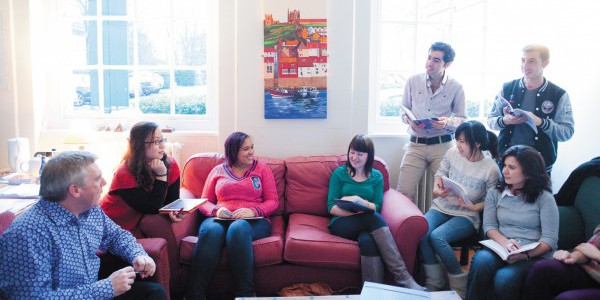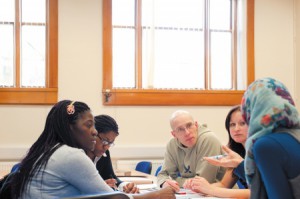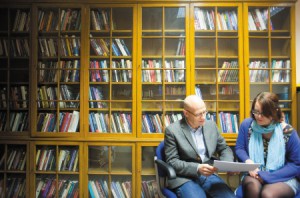
April 20, 2015, by Teaching at Nottingham
Reviewing the 3rd Year in the School of English
Professor Jo Guy: “One of the things we’ve been told consistently by our external examiners is that we have some of the best feedback they’ve seen—the ‘gold standard’; yet this judgment is not reflected in NSS surveys. So we’ve had this problem of not being able to understand why, despite putting a great deal of time and effort into feedback, students still seem to be dissatisfied, and continue to say they don’t get enough.”
“An external TESTA survey which we commissioned helped explain what was happening, in that it suggested that although we were giving a lot of feedback, students were not able to understand how they could use it to improve their marks. This insight in turn suggested that the source of the problem lay with our modes of assessment and the structure of the modular degree: i.e. that we typically gave the most detailed feedback on long summative modes of assessment (such as a 3,500 word essay) that occurred at the end of a module, whereas what students wanted was feedback on their learning through the course of a module, and which they could draw upon for that final assessment. We also realised that because each module was assessed as a discrete unit, we were tending to use the same methods of assessment over and over, and we were also repeatedly assessing the same sorts of skills, but with the perverse result that, despite this repetition, students did not necessarily feel that assessment was helping them improve. In short: our modes of assessment were causing a lot of stress for students, taking up a lot of staff time (in terms of the marking and written feedback we were delivering), but apparently without helping student learning.”
“The second problem we’ve had concerns choice; students have complained in the past that they don’t get enough choice. In response to this, we increased optionality in our second year curriculum; and in our third year curriculum, as the School has grown, so, too, has there been a steady increase in the number of third-year options on offer, since these tend to be taught by individual members of staff and centre on their research specialisms. Yet we have found that increasing the number of modules on offer in the third year does not necessarily improve student satisfaction over the issue of choice. This is because it is not the number and variety of modules they can choose from that seems to matter, as much as the fact that they get their first choices. And here we began to see that proliferating modules can actually make choice more, rather than less, problematic in that when modules are taught by individual members of staff there has to be quite a tight cap on numbers, and this means that it is inevitable that many students won’t achieve all their first choices. There can be nothing more frustrating for a student than seeing a wonderful array of modules—currently we have over 30 options in our third year—only to find that that the three modules they particularly want to do all happen to be oversubscribed. So, once again, we had ended up with a perverse situation whereby growing the numbers of modules on offer in response to growing staff numbers and a growing student body was in practice decreasing choice, since the larger the overall student cohort the more likely it was that any individual third-year module would be oversubscribed or unavailable due to timetabling constraints.”
“Looking closely at how choice operated in our level 3 curriculum then threw up a further anomaly. One of the distinctive features of English at Nottingham is its unusual breadth: it integrates subject-areas—those of drama, performance and creative writing, modern English language, English literature 1500-present, and medieval literature and language—which in other universities are more typically studied separately. However, instead of teaching students the value of connecting these areas of knowledge, the way module choice and assessment methods operated in the third year meant that as students progressed through their degree their learning became increasingly compartmentalised. We saw that there was something of a disconnect between how we thought of ourselves as a school – our ethos and our unique selling point – and what we actually were asking students to do, and the kinds of learning we were assessing.”
“So: from having some initial and discrete concerns about improving our feedback mechanisms and changing our assessment methods we’d come to realise that feedback, assessment and module choice were intimately interconnected, and that we’d need to address all of these issues simultaneously if we wanted to make a significant impact on the student experience. In short: we wanted the help of the Teaching Transformation Programme to start re-thinking the very mechanisms of a modular degree, in terms of considering how a modular system delivered ‘real’ (as opposed to hypothetical) choice, while at the same time having mechanisms of assessment which were ‘fit for purpose’, in terms of being able to help students achieve the kinds of learning outcomes appropriate to the School’s unique identity.”
“Following our meeting with the TTP in May this year, as a first step and initial ‘quick fix’, we radically revised assessment modes across our level 2 and level 3 curricula to operate from Sept 2014. Broadly speaking, we halved the amount of summative assessment enabling us to introduce a whole suite of new kinds of formative assessment so as to provide students with the on-going feedback they want through the course of a module. Working with the TTP gave us the confidence to move fast, and to see that it was
possible to bring about quite fundamental changes very quickly.”
“The project that we are currently working on with the TTP is more ambitious in scope and centres on the issue of module choice and synthetic learning. We are trying to devise a different kind of Level 3 module, one in which choice is offered within a single module in terms, say, of a series of optional themed strands, delivered via lectures, along with some element of synoptic assessment which requires students to make connections between these themes; there would also be a weekly small-group tutorial where students could discuss the lecture materials with a tutor (in other words, delivering an approximation of an ‘Oxford tutorial system’ but bundled into a single module). Offering choice within a module should mean that we can cover the same range of subject-matter but with fewer modules; synoptic assessment could be a means to promote synthetic learning. And because those new modules would be team-taught, they could cope with larger enrolments, thus enabling us to offer them without caps and guarantee choice. We are anticipating that fewer, larger modules will also achieve the economies of scale that would enable the ‘small group’ tutorials to be genuinely small—that is, fewer than 10 students. And genuine small group teaching also holds out the possibility of tutorials being held in staff offices—so less of that time-wasting running up and down the hill to Engineering or Pope that we all hate, and more of the ‘personalised’ teaching spaces that students are consistently demanding.”
 “Of course, putting these ideas into practice will take a lot of time and work: we need to investigate the extent to which subject-areas which are currently taught as discrete specialisms in the third year can indeed be stranded together in ways which are intellectually coherent and lend themselves to the kind of synthetic learning that we want to build in more explicitly to progression in our degree programmes. We need to do some mathematical modelling to investigate more precisely the kinds of economies of scale that might be achieved with such ‘stranded’ modules (that is, how ‘big’ should they be in terms of credits, how much choice can be offered within them?). We also need look again at our curriculum maps, to ensure that the knowledge and skills we currently assess in years one and two, will underpin the kind of learning we envisage taking place in this new level 3 module. The resources of the Teaching Transformation Programme will help us with this work, as well as with consulting with our students, as we want them to feel part of this process. We are already employing some students to help us with the curriculum mapping; and once we have some models in place, we will be rolling out a full consultation process with the whole student body in spring 2015, with a view to introducing this new level 3 curriculum in Sept 2016.”
“Of course, putting these ideas into practice will take a lot of time and work: we need to investigate the extent to which subject-areas which are currently taught as discrete specialisms in the third year can indeed be stranded together in ways which are intellectually coherent and lend themselves to the kind of synthetic learning that we want to build in more explicitly to progression in our degree programmes. We need to do some mathematical modelling to investigate more precisely the kinds of economies of scale that might be achieved with such ‘stranded’ modules (that is, how ‘big’ should they be in terms of credits, how much choice can be offered within them?). We also need look again at our curriculum maps, to ensure that the knowledge and skills we currently assess in years one and two, will underpin the kind of learning we envisage taking place in this new level 3 module. The resources of the Teaching Transformation Programme will help us with this work, as well as with consulting with our students, as we want them to feel part of this process. We are already employing some students to help us with the curriculum mapping; and once we have some models in place, we will be rolling out a full consultation process with the whole student body in spring 2015, with a view to introducing this new level 3 curriculum in Sept 2016.”
“Embarking on such an ambitious project is exciting, but also challenging. Staff will understandably be anxious about proposed changes to teaching practices, not only because of the extra work involved, but also (in this case) because we are looking to change an area of the curriculum which is highly treasured: the individually-taught specialist level 3 modules where staff have opportunities to engage students directly with their own research. In this respect, the value of the Teaching Transformation Programme is that it is providing the School with the resources and support to ensure that the scoping and consultation work is carried out in a sufficiently rigorous manner, so that we build confidence in the process. It is vital that any changes introduced lead to an improved teaching experience for both students and staff: the TTP programme will help us make sure that this is the case.”
Based on an interview with Professor Jo Guy, School of English
No comments yet, fill out a comment to be the first



Leave a Reply